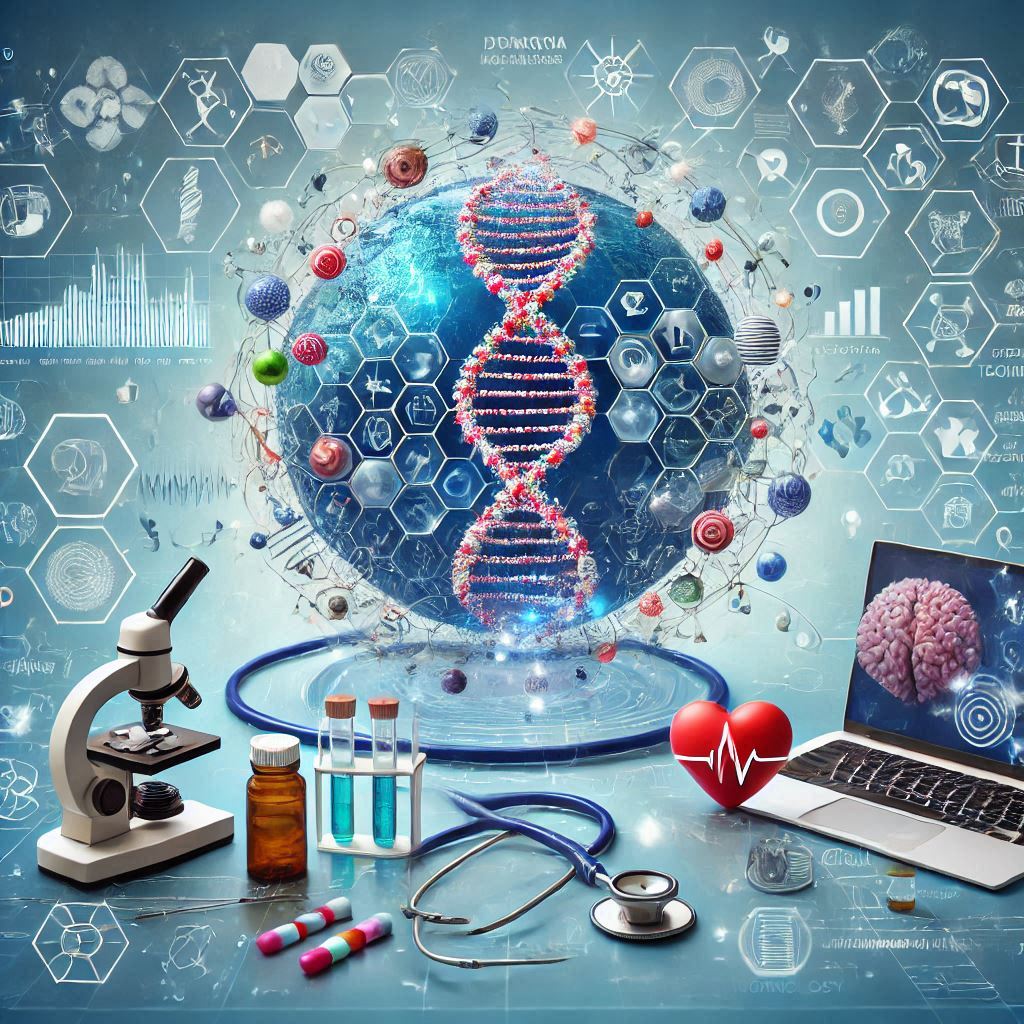Introduction
Biochemistry is a pivotal field in medical research, bridging the gap between biology and chemistry to understand the molecular mechanisms that underpin human health and disease. For medical students, engaging in biochemistry research not only enhances their understanding of complex biological systems but also equips them with the skills necessary for innovative medical practices and advancements. This comprehensive guide explores various biochemistry research topics tailored specifically for medical students, covering disease mechanisms, drug discovery, molecular genetics, and more.
1. Disease Mechanisms and Pathways
Understanding the biochemical pathways involved in disease mechanisms is crucial for developing effective treatments. Researching how molecular dysfunctions contribute to diseases can lead to innovative therapeutic strategies.
| Topic | Description | Reference |
|---|---|---|
| Oxidative Stress in Neurodegenerative Diseases | Investigating the role of oxidative damage in diseases like Alzheimer’s and Parkinson’s. | NCBI Article |
| Warburg Effect in Cancer Metabolism | Studying how cancer cells prefer glycolysis over oxidative phosphorylation. | Nature Review |
| Apoptosis Pathways in Autoimmune Diseases | Exploring how programmed cell death dysregulation leads to autoimmune conditions. | ScienceDirect |
2. Biomarkers and Diagnostics
Identifying biomarkers is essential for early disease detection and monitoring. Biomarkers can provide valuable insights into disease progression and treatment efficacy.
| Topic | Description | Reference |
|---|---|---|
| Novel Biomarkers for Early Cancer Detection | Discovering new biochemical markers that can detect cancer in its initial stages. | NIH Fact Sheet |
| Biochemical Changes in Sepsis | Analyzing blood plasma alterations in sepsis patients for diagnostic purposes. | Elsevier Clinical Biochemistry |
| Protein Misfolding in Prion Diseases | Studying misfolded proteins as diagnostic markers in prion-related disorders. | UCLA Prion Research |
3. Drug Discovery and Development
The process of drug discovery involves identifying new therapeutic targets and developing compounds that can modulate these targets effectively. Biochemistry plays a vital role in understanding how drugs interact at the molecular level.
| Topic | Description | Reference |
|---|---|---|
| Enzyme Inhibition in Viral Infections | Designing inhibitors that target viral proteases to prevent replication. | NCBI Article |
| CRISPR/Cas9 in Personalized Medicine | Using gene-editing technologies to develop tailored medical treatments. | Nature Genetics |
| Drug Resistance Mechanisms in Cancer | Investigating how cancer cells develop resistance to chemotherapy drugs. | ScienceDirect |
4. Metabolic Disorders
Researching metabolic disorders involves studying the biochemical pathways that regulate metabolism and how their dysfunction leads to diseases like diabetes and obesity.
| Topic | Description | Reference |
|---|---|---|
| Lipid Metabolism in Obesity | Exploring how dysregulated lipid metabolism contributes to obesity and atherosclerosis. | NCBI Article |
| Ketogenic Diets and Mitochondrial Function | Studying the impact of ketogenic diets on mitochondrial energy pathways. | Frontiers in Physiology |
| Glucose Transporters in Type 2 Diabetes | Analyzing the role of glucose transporters in insulin resistance and diabetes. | NCBI PMC |
5. Neurochemistry
Neurochemistry explores the biochemical processes within the nervous system. Research in this area can lead to a better understanding of neurological disorders and the development of targeted treatments.
| Topic | Description | Reference |
|---|---|---|
| Neurotransmitters in Mood Disorders | Investigating how neurotransmitter imbalances contribute to depression and anxiety. | NCBI PMC |
| Synaptic Plasticity in Learning Disorders | Studying biochemical changes in synapses that affect learning and memory. | Nature Reviews Neuroscience |
| Amyloid Beta Aggregation in Alzheimer’s Disease | Exploring the biochemical pathways leading to amyloid beta plaque formation. | Alzheimer’s Research |
6. Immunology and Biochemistry
Combining immunology with biochemistry allows for a deeper understanding of the immune system’s molecular mechanisms. This knowledge is crucial for developing immunotherapies and vaccines.
| Topic | Description | Reference |
|---|---|---|
| T-cell Activation Pathways | Investigating the biochemical signals that activate T-cells in the immune response. | Journal of Immunology |
| Cytokines in Autoimmune Diseases | Studying how cytokines regulate inflammation and contribute to autoimmune conditions. | NCBI PMC |
| Vaccine Adjuvants and Immune Response | Analyzing the role of adjuvants in enhancing the efficacy of vaccines. | Nature Reviews Drug Discovery |
7. Clinical Biochemistry
Clinical biochemistry focuses on the biochemical processes related to human health and disease. Research in this area is essential for developing diagnostic tools and understanding disease pathology.
| Topic | Description | Reference |
|---|---|---|
| Hormonal Regulation in Endocrine Disorders | Exploring biochemical mechanisms behind thyroid dysfunction and other endocrine disorders. | Endocrine Society |
| Liver Enzymes in Hepatobiliary Diseases | Studying how liver enzyme levels indicate hepatobiliary health and disease. | NCBI Bookshelf |
| Hemoglobin Variants in Sickle Cell Anemia | Analyzing the biochemical properties of hemoglobin variants that cause sickle cell disease. | NCBI PMC |
8. Molecular Genetics
Molecular genetics explores the relationship between genes and their biochemical functions. This research is fundamental for understanding genetic disorders and developing gene-based therapies.
| Topic | Description | Reference |
|---|---|---|
| Epigenetic Modifications in Cancer | Studying how epigenetic changes influence cancer development and progression. | Nature Reviews Genetics |
| MicroRNAs in Gene Regulation | Exploring the role of microRNAs in post-transcriptional regulation of genes. | NCBI PMC |
| Next-Generation Sequencing in Genetic Disorders | Utilizing advanced sequencing technologies to identify mutations in rare genetic diseases. | Genome.gov |
9. Emerging Technologies in Biochemistry
Advancements in technology are revolutionizing biochemistry research. Embracing these emerging technologies can lead to groundbreaking discoveries and innovative solutions in medicine.
| Topic | Description | Reference |
|---|---|---|
| Metabolomics in Disease Understanding | Applying metabolomic techniques to map and analyze metabolic networks in diseases. | Frontiers in Physiology |
| Proteomics for Protein-Protein Interactions | Using proteomic approaches to study interactions between proteins within cells. | Nature Proteomics |
| Bioinformatics in Personalized Drug Design | Leveraging bioinformatics tools to design drugs tailored to individual genetic profiles. | BioRxiv |
10. Nutrition and Biochemistry
The interplay between nutrition and biochemistry is fundamental for maintaining health. Researching how nutrients affect biochemical pathways can lead to better dietary recommendations and treatments for nutritional deficiencies.
| Topic | Description | Reference |
|---|---|---|
| Dietary Antioxidants and Oxidative Stress | Studying how antioxidants in the diet mitigate oxidative stress and prevent cellular damage. | NCBI PMC |
| Omega-3 Fatty Acids in Inflammation Reduction | Exploring the biochemical role of omega-3 fatty acids in reducing inflammatory responses. | Nature Scientific Reports |
| Gut Microbiota and Mental Health | Investigating the biochemical interactions between gut microbiota and the brain affecting mental health. | NCBI PMC |
11. Environmental Biochemistry
Environmental biochemistry examines the biochemical processes affected by environmental factors. Research in this area is crucial for understanding the impact of pollutants and developing strategies for environmental protection.
| Topic | Description | Reference |
|---|---|---|
| Heavy Metal Toxicity Mechanisms | Studying how heavy metals disrupt biochemical processes in humans. | NCBI PMC |
| Detoxification of Xenobiotics | Exploring biochemical pathways involved in the detoxification of foreign compounds. | ScienceDirect |
| Biochemical Effects of Air Pollution | Analyzing how air pollutants affect respiratory health at the biochemical level. | NCBI PMC |
Frequently Asked Questions (FAQs)
1. What are the best biochemistry research topics for medical students?
Some of the best biochemistry research topics for medical students include disease mechanisms, drug discovery, metabolic disorders, neurochemistry, immunology, clinical biochemistry, molecular genetics, and emerging technologies like metabolomics.
2. How can biochemistry research benefit my medical career?
Engaging in biochemistry research enhances your understanding of molecular and cellular processes, develops critical thinking and laboratory skills, and can lead to innovations in medical treatments and diagnostics, thereby advancing your medical career.
3. What skills are required for biochemistry research in medicine?
Essential skills include strong analytical and problem-solving abilities, proficiency in laboratory techniques, attention to detail, effective communication, and the ability to work collaboratively in multidisciplinary teams.
4. Where can I find resources for biochemistry research projects?
Resources for biochemistry research projects can be found in academic journals, online databases like PubMed, university libraries, research institutions, and by collaborating with faculty members and experts in the field.
5. Can biochemistry research lead to innovations in medical treatments?
Absolutely. Biochemistry research is fundamental in understanding disease mechanisms, which can lead to the development of new drugs, therapies, and diagnostic tools, thereby driving innovations in medical treatments.



